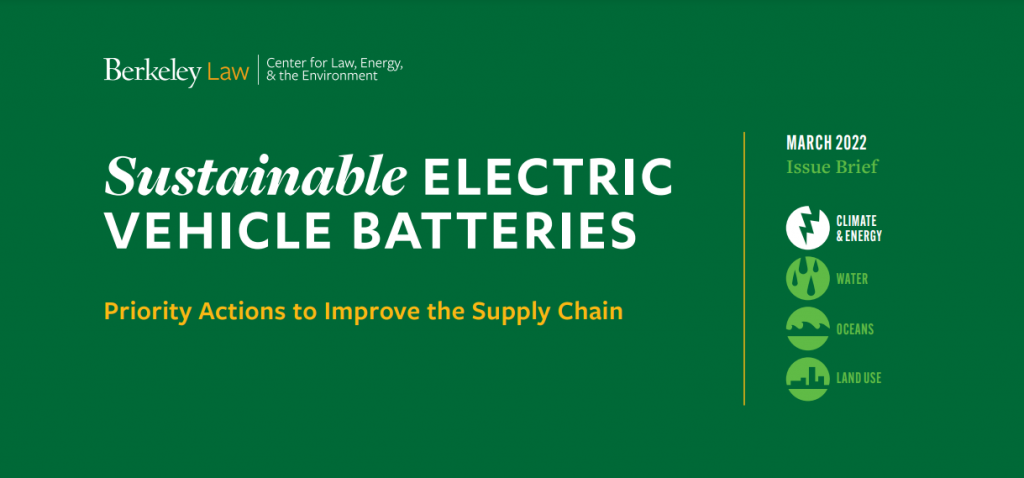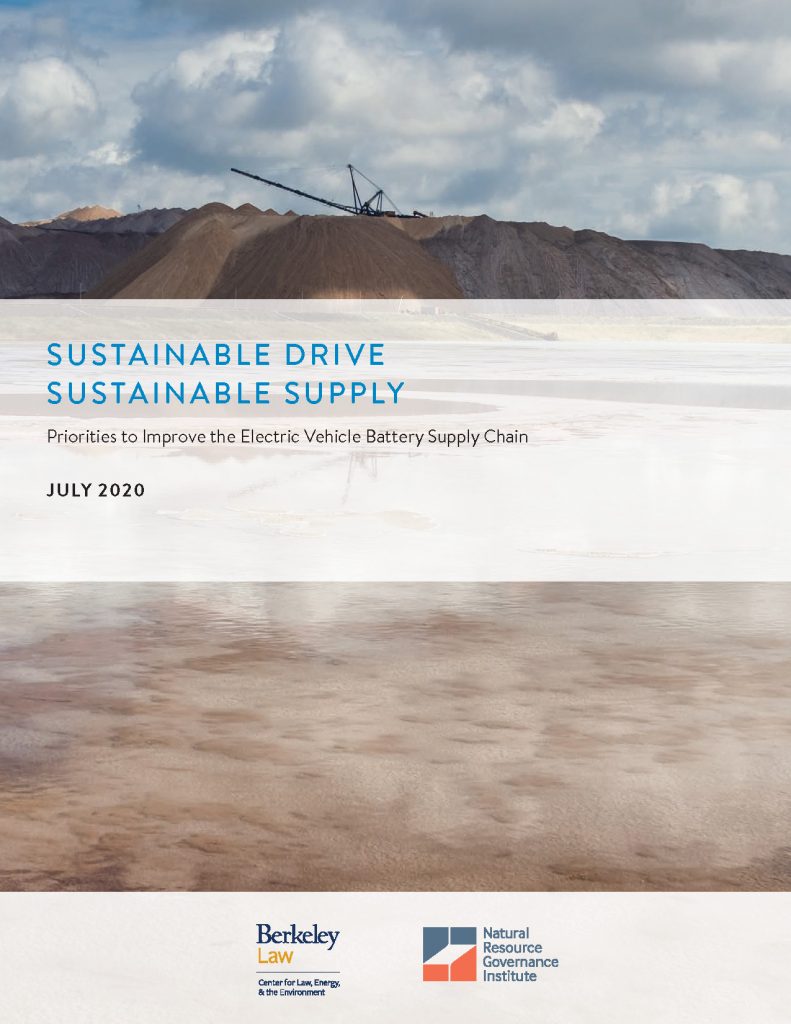
In the race to scale up a global supply chain for electric vehicle batteries, mining justice advocates have sought to ensure that the ongoing clean technology minerals boom does not exacerbate longstanding negative impacts from the global mining industry. Chief among these are corruption risks.
To provide guidance to electric vehicle purchasers (particularly fleets), advocates, and leaders in “downstream” markets about how to support anti-corruption measures in the battery supply chain, Berkeley Law’s Center for Law, Energy and the Environment (CLEE) partnered with the Natural Resource Governance Institute to issue a new policy brief: Corruption Risks in the EV Battery Supply Chain: What Advocates, Automakers and Fleet Purchasers Can Do.
The brief presents a set of actions for “downstream” markets, such as in the United State and European Union. Among the steps that the report recommends these actors take:
- Battery manufacturers, automakers, and fleet purchasers could integrate checks on corruption risks into responsible sourcing and due diligence systems. Risks from supply chain relationships may directly affect company operations, and companies can leverage their influence to promote better practices and policies. When necessary, they should be willing to disengage or suspend engagement with suppliers.
- Manufacturers, automakers and purchasers could also encourage project-level contract, payment, commodity trading, and beneficial ownership transparency and robust ethics and compliance policies from suppliers. Companies could look for comprehensive project or sale-level disclosure of contracts and licenses, payments to governments, and verified beneficial ownership information, internal oversight and independence of ethics and compliance procedures, robust disciplinary and remediation procedures.
- Electrification and sustainable mining advocates in North America and Europe could emphasize the importance of governance and anti-corruption measures in their advocacy. Specifically, advocates can better incorporate anticorruption into benchmarks or reports that assess companies’ sustainability provisions and/or responsible sourcing.
- Advocates could push for governments to incorporate strong anticorruption provisions into sustainability criteria for mining projects, in policies and legislation addressing responsible sourcing or due diligence, and in partnerships or trade deals with mineral-producing countries.
Ultimately, corruption is not a victimless crime. It undermines trust in government and deprives the public of needed revenues from mining projects. It can also jeopardize supply chain affordability and reliability as the world makes this critical transition to a cleaner transportation system. With the steps outlined in Corruption Risks in the EV Battery Supply Chain: What Advocates, Automakers and Fleet Purchasers Can Do, advocates, purchasers and downstream market leaders have an opportunity to ensure that the electric vehicle mining boom doesn’t replicate past and ongoing harms from the global mining sector.

Building the mineral supply chain needed to deploy electric vehicles (including cars, buses, bicycles, and scooters) on a massive scale, if done without planning and engagement, could exacerbate environmental and social harms to communities in countries and regions where minerals are mined and processed (and, to a lesser extent, manufactured and later recycled) into usable batteries. A typical electric vehicle battery requires an array of minerals, including lithium, cobalt, and nickel, among others. Many of the locations with the richest supply of these resources are in countries or near communities with histories of governance challenges and exploitation of local and indigenous communities for resource extraction.
Governments, companies, communities, and civil society organizations face a daunting challenge: increase electric vehicle adoption and battery production, while ensuring the highest level of protection for human rights, community consent and input, and the environment.
To address this challenge, UC Berkeley Law’s Center for Law, Energy and the Environment (CLEE) convened experts in December 2021 to discuss opportunities for increased advocacy and collaboration and to identify policy challenges and opportunities. Our new policy brief highlights key solutions including battery labeling standards, mining law reform, and increased technical assistance. Convening participants identified opportunities for advocates and industry leaders to improve international coordination, advocacy efforts, community engagement, and circular economy practices.
Key barriers and solutions include:
- Barrier 1: Poor supply chain governance. Policymakers lack comprehensive and targeted governance strategies to minimize harm at each stage of battery material’s lifecycle.
- Example solution: Strengthen binding measures. Enhancing binding legal and regulatory measures would support enforcement while promoting global consistency around supply chain sustainability expectations.
- Barrier 2: Lack of attention to community needs and human rights. Current mineral supply chain systems too often fail to incorporate the rights, priorities, and needs of vulnerable groups and communities impacted by mining and processing activities, as well as the transportation activities that support movement of minerals (such as additional pollution from construction and transportation vehicles, or noise from new roads).
- Example solution: Bolster technical assistance and funding. Advocacy organizations, philanthropic organizations, research institutions, and governments could allocate more resources towards supporting human rights and community priorities through funding and technical assistance.
- Barrier 3: Lack of incentives for circular economy practices and demand reduction. A lack of emphasis on circularity, and on strategies to minimize the projected demand for new battery materials while still achieving transportation decarbonization, poses a barrier to a sustainable supply chain that promotes human rights and environmental protection.
- Example solution: Set recycled content targets. Implementing targets for incorporating recycled materials into new battery cells could promote market demand for recycled materials over newly extracted materials.
For a full set of solutions and to learn more, see the policy brief here.
Cross-posted and adapted from co-author Katie Segal’s blog on Legal Planet.

CLEE and the Natural Resource Governance Institute (NRGI) are pleased to release today the new report “Sustainable Drive, Sustainable Supply: Priorities to Improve the Electric Vehicle Battery Supply Chain.” The report identifies key challenges and solutions to ensure battery supply chain sustainability through a multi-stakeholder approach, based on our outreach to experts in the field.
The global transition from fossil fuel-powered vehicles to battery electric vehicles (EVs) will require the production of hundreds of millions of batteries. This massive deployment frequently raises questions from the general public and critics alike about the sustainability of the battery supply chain, from mining impacts to vehicle carbon emissions.
To address these questions, CLEE and NRGI are conducting a stakeholder-led research initiative focused on identifying strategies to improve sustainability and governance across the EV battery supply chain. CLEE and NRGI convened leaders from across the mining, battery manufacturing, automaker, and governance observer/advocate sectors, to develop policy and industry responses to human rights, governance, environmental, and other risks facing the supply chain.
“Sustainable Drive, Sustainable Supply” identifies the following key challenges to ensuring battery supply chain sustainability:
- Lack of coordinated action, accountability, and access to information across the supply chain hinder sustainability efforts
- Inadequate coordination and data sharing across multiple supply chain standards limit adherence
- Regulatory and logistical barriers inhibit battery life extension, reuse, and recycling
The report recommends the following priority responses that industry, government and nonprofit leaders could take to address these challenges:
- Industry leaders could strengthen mechanisms to improve data transparency and promote neutral and reliable information-sharing to level the playing field between actors across the supply chain and between governments and companies
- Industry leaders and third-party observers could ensure greater application of supply chain sustainability best practices by defining and categorizing existing standards and initiatives to develop essential criteria, facilitate comparison and equivalency, and streamline adherence for each segment of the supply chain
- Governments and industry leaders could create new incentives for supply chain actors to participate in and adhere to existing standards and initiatives, which may include sustainability labeling and certification initiatives
- Industry leaders could design batteries proactively for disassembly (enabling recycling and reuse), and industry leaders and governments could collaborate to build regional infrastructure for battery recycling and transportation and create regulatory certainty for recycling
We hope the responses to the supply chain challenges outlined in this report will provide guidance on the initial actions stakeholders can take to make this broader vision of implementation a reality, ensuring a more robust future for communities around the globe as well as for all-important electric vehicle adoption to meet climate change goals.
To learn more about this issue and the new report, join our 9am PT / Noon ET webinar today, featuring:
- Patrick Heller, Senior Visiting Fellow, Center for Law, Energy & the Environment (CLEE) & Advisor, Natural Resource Governance Institute (NRGI)
- Michael Maten, Automotive Public Policy, Electrification, Portfolio Planning and Strategy, General Motors
- Daniel Mulé, Senior Policy Advisor for Tax and Extractive Industries, Oxfam
- Payal Sampat, Mining Program Director, Earthworks
You can register for the webinar; read our recent FAQ on EV batteries for more information on current supply chain impacts on human rights, climate change and the local environments; and download the new report “Sustainable Drive, Sustainable Supply: Priorities to Improve the Electric Vehicle Battery Supply Chain.”
The UCLA/Berkeley Law webinar on repurposing electric vehicle batteries for grid storage is now on-line. The September 19th event discusses key recommendations from the new report “Reuse and Repower” and features Adam Langton, Senior Energy Analyst at the California Public Utilities Commission, and Randall Winston, Special Assistant to the Executive Secretary in the Office of Governor Brown.
You can watch the one-hour video here or below:


